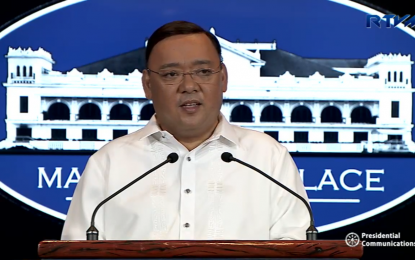
Presidential Spokesperson Harry Roque
MANILA – Malacañang said it will abide by the Supreme Court (SC) ruling on the petition challenging the newly-signed Anti-Terrorism Act of 2020.
Presidential Spokesperson Harry Roque made this remark after a group of lawyers electronically filed at the SC a petition which seeks to prohibit the anti-terrorism law from being enforced.
“The Palace will leave it to the SC to decide on these petitions and will abide by whatever the ruling is,” Roque said in a statement on Sunday.
Earlier, Roque said the anti-terrorism law is “at par” with the anti-terrorism legislation of the developed countries.
He explained that other countries such as the United States and the United Kingdom had “more draconian” laws compared to the Philippines.
On Saturday, a group of lawyers electronically filed a petition for Certiorari and Prohibition with Urgent Prayer for the Issuance of a Temporary Restraining Order (TRO) and Writ of Preliminary Injunction and/or Other Injunctive Remedies questioning the anti-terrorism law.
"[We] respectfully pray that judgment be rendered by the Honorable Supreme Court issuing a Temporary Restraining Order, Writ of Preliminary Injunction and/or Other Injunctive Remedies to prevent the enforcement of the anti-terrorism act beginning July 19, 2020, the same having been published in the Official Gazette on July 3, 2020," the petitioners said.
The group, which is led by law professor and lawyer Howard Calleja, will proceed to the high court on Monday to physically file the petition.
The list of petitioners also include lawyer Joseph Peter Calleja, law professor Christopher John Lao, Reynaldo J. Echavez, Napoleon Siongco, Raeyan Reposar, civic groups Tunay na Bayani and Bagong Siklab Pilipinas, and former Education Secretary Bro. Armin Luistro.
Meanwhile, the National Union of Peoples Lawyers deferred its plan to challenge the legality of the anti-terror law before the SC to include more interested petitioners.
The Anti-Terrorism Act of 2020 or Republic Act (RA) 11479, which was signed by President Rodrigo Duterte on Friday, aims to protect life, liberty, and property from terrorism deemed as “inimical and dangerous to the national security of the country and to the welfare of the people.”
“The State recognizes that the fight against terrorism requires a comprehensive approach, comprising political, economic, diplomatic, military, and legal means duly taking into account the root causes of terrorism without acknowledging these as justifications for terrorist and/or criminal activities,” the law reads.
Under RA 11479, acts intended to cause death or serious injury to any person, extensive damage to a government facility, and extensive interference with destruction to critical infrastructure are likewise considered as terror acts.
The newly-signed law also states that individuals who either use weapons, explosives, and chemical weapons or release dangerous substances causing fire, floods, or explosions are considered terrorists.
A 12-year imprisonment will be meted on any person who threatens to commit any of the terror acts mentioned in the law.
The law also warns that people who propose to commit or join terror acts would be punished by serving a 12-year jail term. (PNA)
